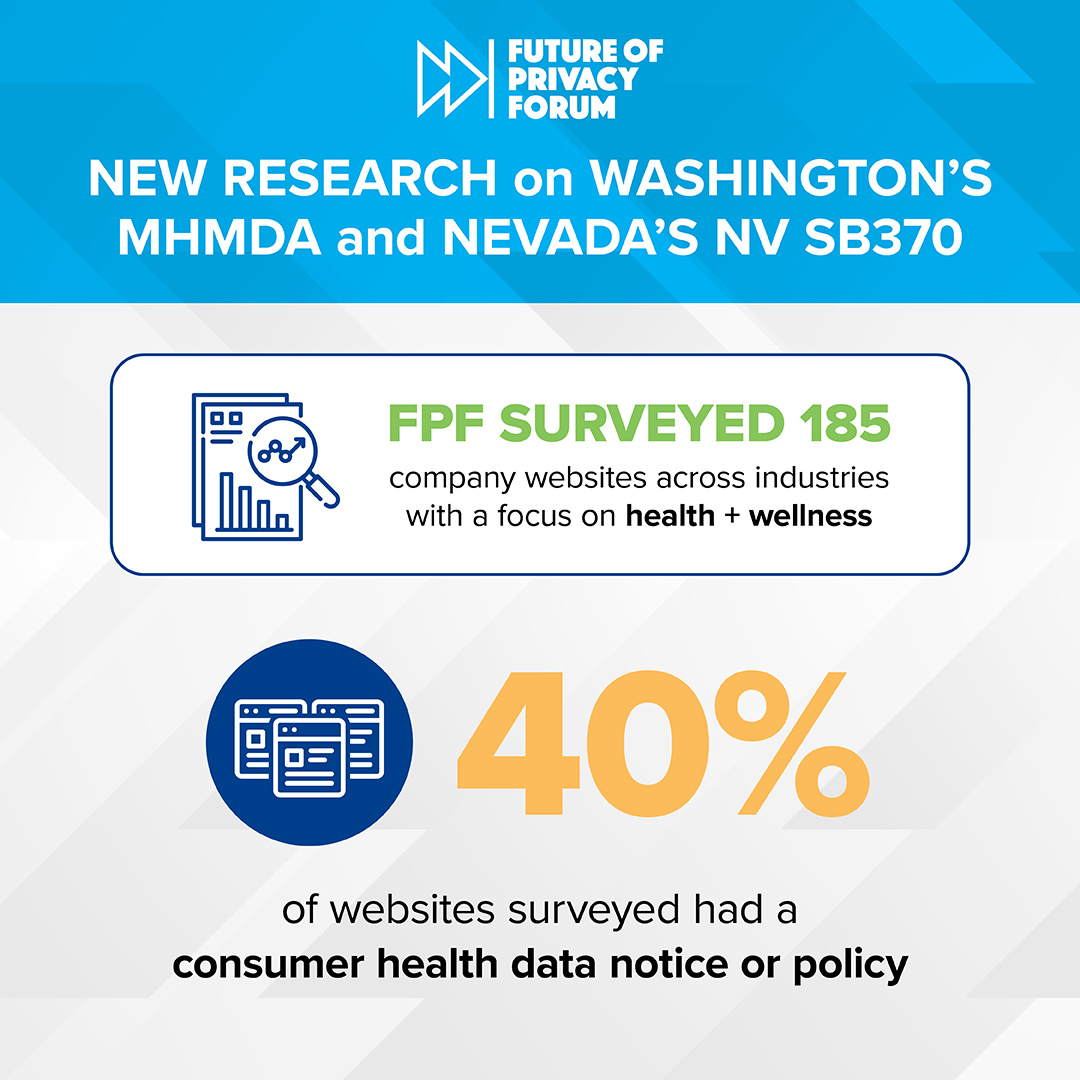Showing results for virg xped app promo code puerto rico

Consumer Health Data Privacy Notices by the Numbers
[…] Many thanks to Niharika Vattikonda, Angela Guo, and Jeter Sison for the tireless data work on this project! Limitations: Data was limited to websites accessed via desktop. App interfaces were not included in the survey. No virtual personal networks (VPNs) were used (ex. a VPN based in Washington state.) Please reach out Jordan Wrigley, […]

FPF CHDPP Data Set Infographic
[…] one notice or policy. California state privacy laws typically had a separate notice section or webpages in privacy policies. Example: УFor residents of Colorado, Connecticut, Utah, and VirginiaФ Sections in or as part of broader privacy policy were less common Stand-alone webpages for notices were more common Separate and distinct language for MHMDA Separate […]

Contextualizing the Kids Online Safety and Privacy Act: A Deep Dive into the Federal Kids Bill
[…] kids and teens online, some of which have been the subject of litigation. Amongst all this activity, the Kids Online Safety and Privacy Act takes a new approach that is unlike much of what we have seen before. Like other proposals, the bill would create heightened protections for teens, and new protections for design […]

Final-Privacy-Principles-Edits-2
SEPTEMBER 2018 1 PRIVACY PRINCIPLES FOR FACIAL RECOGNITION TECHNOLOGY IN COMMERCIAL APPLICATIONS INTRODUCTION The consumer – facing applications of facial recognition technology continue to evolve and appear in new contexts . There are several key functions that benefit from facial recognition technology , including : (1) safety and security; (2) access and authentication; (3) […]

FPF Samsara Video-Based VSS Whitepaper PRINT R1 wBleed
[…] Legal, Samsara Meera Bhaskar Product Legal, Samsara Jovanna Bubar Product Legal, Samsara ACKNOWLEDGEMENTS All FPF materials that are released publicly are free to share and adapt with appropriate attribution. Learn more at creativecommons.org. FUTURE OF PRIVACY FORUM | J U LY 2 0 2 4 1 R ecent years have seen an increasing deployment […]

Reflections on California’s Age-Appropriate Design Code in Advance of Oral Arguments
Co-authored with Isaiah Hinton, Policy Intern for the Youth and Education Team Update: On Wednesday, July 17th, the U.S. 9th Circuit Court of Appeals heard oral arguments for an appeal of the District Court’s preliminary injunction of the California Age-Appropriate Design Code Act (AADC). Judges Milan Smith Jr., Mark Bennett, and Anthony Johnstone appeared […]

FPF Confidential Computing R3
[…] FPF community who provided invaluable feedback on early drafts of this paper. ACKNOWLEDGEMENTS All FPF materials that are released publicly are free to share and adapt with appropriate attribution. Learn more. 1 A. The Basics: What is Confidential Computing? Confidential computing is an emerging term for a privacy-enhancing technology (“PET”) that has the novel […]

FPF EU AI Act Timeline July 24
[…] effect and enforcement . The Member States have to identify their Fundamental Rights authorities within three months after the entry into force. (Art. 77(2)) Scope and Definitions appl y, six months after the entry into force. (Art. 113(a)) Provisions on Prohibited AI kick off, six months after the entry into force. (Art. 113(a)) The […]

Research Coordination Network for Privacy-Preserving Data Sharing and Analytics Focused on Artificial Intelligence
[…] Energy and National Science Foundation, FPF is building a Research Coordination Network (RCN) for Privacy-Preserving Data Sharing and Analytics running through June 2027. The RCN analyzes and promotes the trustworthy adoption of Privacy Enhancing Technologies (PETs) in the context of artificial intelligence (AI) and other key technologies. Our goal is to support the development, […]

Protected: Protected: FPF Training Program 2024 – Main
There is no excerpt because this is a protected post.
